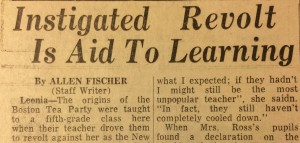I arrived at my 5th grade classroom one winter morning and saw unusual flowery script on the blackboard. In a stern voice, our teacher read aloud :
“Proclamation: From this day forth, every assignment and test must be handed in with a “stamp.” Stamps must be purchased with ten copies of the week’s spelling list. Severe penalties if you do not comply. No exceptions. Signed, The Duchess of Ross.”
My teacher, Mrs. Ross, was new to the elementary school that year. We students found her “nice” – she was caring and had command over the classroom without raising her voice. I had relaxed into enjoying learning American history and advanced multiplication. So this sudden change in our teacher’s demeanor felt really out of the blue.

But no one openly questioned her – at first. We got to work. For each worksheet we had to write the spelling list ten times, which meant 100 words to purchase one stamp. By the end of that joyless day I had writer’s cramp.
That night I did my homework – along with writing my spelling list over and over – extra times to try to get ahead – it was oppressive, but I didn’t rebel. I had spent half of my young life in a school system that reinforced my obedience to follow the rules. That won me the approval of my teachers and I liked getting good grades.
Finally on the third day I saw a few kids ask for a pass to the principal’s office and then march out of the classroom. I found out later they had complained to the principal about our teacher’s unreasonable demands. He apparently backed up her authority, but also dropped a hint to read our history textbook.
In fact we had a history assignment that morning and I sat there reading. “The Stamp Act and the Boston Tea Party were key events leading up to….” A murmur began to build in the room as recognition struck. A small group of “rebels” whispered and then went over to the teacher’s desk and threw down their papers. They said loudly, “We refuse to pay for stamps anymore.”
I jumped up, along with most of the class. We dumped our stamps in the garbage and we threw our papers on our teacher’s desk. There were a few Loyalists who stayed at their desks and continued to write their spelling words, still trying to please the teacher.
The Duchess of Ross stood and declared, “I do not want war in my classroom. I hereby revoke the Stamp Act.”
We all cheered. One kid even climbed up on a chair to reach the American flag  and started waving it about. Once the pandemonium settled down, Mrs. Ross gathered us and asked, “How did it feel to have to pay for stamps for every assignment?”
and started waving it about. Once the pandemonium settled down, Mrs. Ross gathered us and asked, “How did it feel to have to pay for stamps for every assignment?”
“It was mean!“It was terrible!”
“It was so unfair!”
“How do you think the colonists felt under British rule?”
I think Mrs. Ross was ahead of her time, revolutionary in fact. To this day, and especially these days, Mrs. Ross reminds me to speak up when I sense injustice … and to resist.
